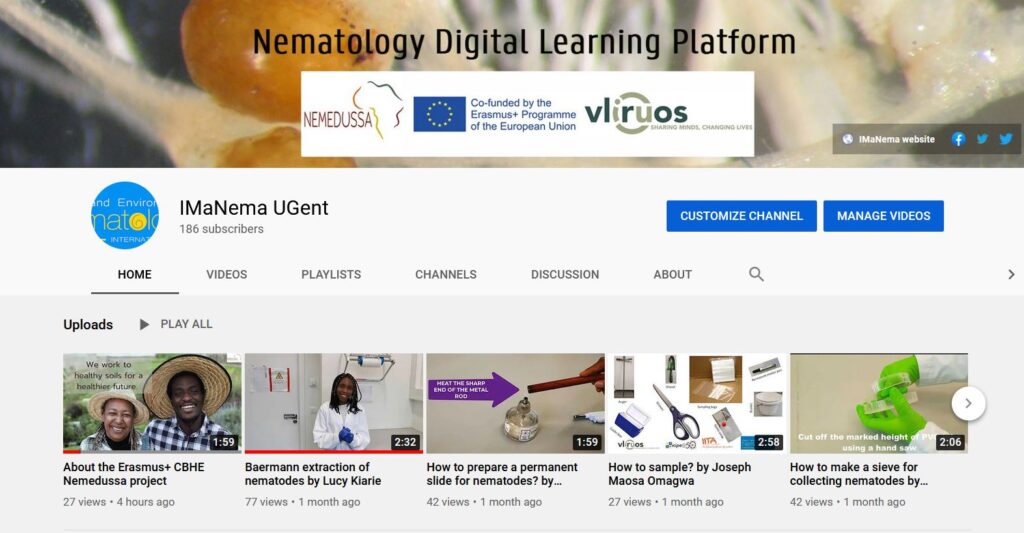Integration of nematology in university curricula
Given the tremendous actual and potential impact that plant-parasitic nematodes (PPN) can have on African agriculture, the manifest lack of exposure to the disciple of nematology at Higher Education Institutes (HEIs) is remarkable.. Nematology often serves only as a complementary component of other curricula (i.e., plant protection, entomology) and mainly at graduate level. Nematodes therefore remain a persistently overlooked concern and opportunity in comparison with other disciplines.
Research indicates that the lack of attraction to nematology could be mainly linked to the limited exposure of the discipline in general and particularly in Africa (Talwana et al., 2015; Cortada et al., 2019). Limited understanding and awareness within the higher education system in Sub-Saharan Africa regarding the fundamental importance of nematology as a discipline has resulted in a lack of trained HEI staff and a lack of expertise at all levels, ranging from farmers, extension officers, non-profit and private sector workers, academics and policy-makers. Hence, this limited perception by end-users about the importance of managing PPNs in the agricultural sector contributes to poor agricultural productivity and threatens food security in SSA (Coyne et al., 2018). The inclusion of nematology at the initial stages of higher education in any country is crucial to maximizing the number of students exposed to the discipline, resulting in better-prepared, more fully-informed graduates entering the job market. In SSA, increasing the numbers of well-trained nematology students will be vital in addressing the many nematology-related problems in the area, ranging from farming systems to agricultural policies, as well as in providing sustainable solutions to food security and environmental health in the region
Therefore the NEMEDUSSA project aims to develop BSc and MSc modules in Nematology to be either integrated fully into existing BSc and MSc programmes or enhance existing course units in nematology at the Nemedussa partner HEIs in SSA.
These BSc and MSc course modules will be developed with supporting lecture material including handbooks for both lecturers and students, webinars and knowledge clips. The material will be available in French and English.
The BSc module will be a course unit from 3 weeks, including theory and an intensive 1 week practical training. It will give an overview of the variety of aspects of the nematology discipline with a focus on a (sub)tropical context and aligning it with the needs of the job market. The following subjects will be covered, but may not be restricted to:
- General biology of nematodes
- Basic nematology techniques
- Identification of major nematode groups and important plant-parasitic nematodes
- Symptoms of nematode damage
- Basic principles of management of plant-parasitic nematodes
- Introduction to the use of nematodes in biological control
The BSc module will be amply tested and evaluated at all partner HEIs in SSA and finally integrated in their existing BSc programmes in agriculture/biology.
The MSc module was already developed at Moi University in Kenya and will be given for the first time in 2021. After that it will be reviewed and additional lecture material developed to improve the course content and learning materials. Next to this, the MSc module will be translated into French. The partner HEIs in Benin will jointly offer the MSc course module, resulting in an additional training in nematology on MSc level available for the francophone speaking countries in Africa.
Additional funds from VLIR-UOS will sponsor trainees from francophone countries in SSA to attend the BSc and MSc course modules in Benin.
Staff training at SSAn Higher Education Institutes (HEIs) and upgrading facilities
45 staff members from SSAn Nemedussa consortium partners will be trained in different nematology sub-disciplines by:
- Ghent University: International Master of Science in Agro- and Environmental Nematology – IMaNema
- Université Côte d’ Azur: Master of Science Biocontrol Solutions for Plant Health – BOOST
- Stellenbosch University
- NemAfrica team at the International Institute of Tropical Agriculture and International Center of Insect Physiology and Ecology: Basic Crash Course Nematology
Next to this, SSAn Nemedussa consortium partners will upgrade their training facilities with (demonstration) compound microscopes, stereomicroscopes, sieves, pipettes and multimedia facilities for online training sessions.

Nematology Digital Learning Platform
The BSc and MSc lecture material will be uploaded on the freely accessible Nematology Digital Learning Platform and a YouTube channel. It will therefore be accessible to our partners, but also to any other potential university interested in integrating or enhancing nematology in their curricula.